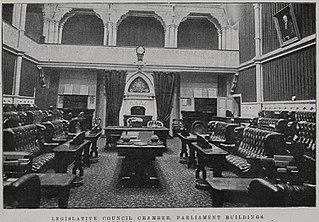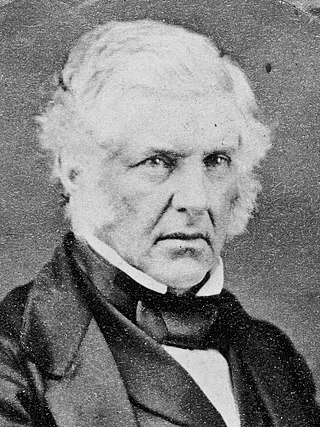
The House of Representatives is the sole chamber of the New Zealand Parliament. The House passes laws, provides ministers to form Cabinet, and supervises the work of government. It is also responsible for adopting the state's budgets and approving the state's accounts.

The speaker of a deliberative assembly, especially a legislative body, is its presiding officer, or the chair. The title was first used in 1377 in England.

In New Zealand, the speaker of the House of Representatives, commonly known as the speaker of the House, is the presiding officer and highest authority of the New Zealand House of Representatives. The individual who holds the position is elected by members of the House from among their number in the first session after each general election. They hold one of the highest-ranking offices in New Zealand. The current Speaker is Gerry Brownlee, who was elected on 5 December 2023.
Richard James Gerard is a former New Zealand politician. He was a National Party Member of Parliament from 1984 to 1997.

The New Zealand Legislative Council was the upper house of the General Assembly of New Zealand between 1853 and 1951. An earlier arrangement of legislative councils for the colony and provinces existed from 1841 when New Zealand became a colony; it was reconstituted as the upper house of a bicameral legislature when New Zealand became self-governing in 1852, which came into effect in the following year.

The 1853 New Zealand general election was a nationwide vote to determine the shape of the New Zealand Parliament's first term. It was the first national election ever held in New Zealand, although Parliament did not yet have full authority to govern the colony, which was part of the British Empire at that time. Elections for the first provincial councils and their Superintendents were held at the same time.

The 1879 New Zealand general election was held between 28 August and 15 September 1879 to elect a total of 88 MPs to the 7th session of the New Zealand Parliament. The Māori vote was held on 8 September. A total of 82,271 (66.5%) European voters turned out to vote, plus 14,553 Māori voters. Following the election, John Hall formed a new government.

In the United Kingdom, the Chairman of Ways and Means is a senior member of the House of Commons who acts as one of the Speaker's three deputies. The incumbent is Dame Eleanor Laing, MP for Epping Forest, who was first elected to the office on 8 January 2020.

Palmerston North is a parliamentary electorate, returning one Member of Parliament to the New Zealand House of Representatives. The electorate was first formed for the 1890 election and was called Palmerston until 1938. The current MP for Palmerston North is Tangi Utikere of the Labour Party. He has held this position since the 2020 election.

Sir Charles Ernest Statham was a New Zealand politician, and the ninth Speaker of the House of Representatives, from 1923 to 1935.

Sir Matthew Henry Oram was a New Zealand politician of the National Party. He was the 13th Speaker of the House of Representatives, from 1950 to 1957.

Reader Gillson Wood was a 19th-century New Zealand politician. An architect by trade, he designed the 1854 General Assembly House built as New Zealand's first meeting house for the House of Representatives.

Arthur Penrose Seymour was a 19th-century New Zealand politician from Picton. He was the 4th Superintendent of the Marlborough Province and was a member of the provincial government for all 16 years of its existence. With his strong advocacy for Picton, he successfully had the Seat of Government moved to Picton. When the Blenheim party secured a majority in the Provincial Council by 1865, Seymour negotiated the removal of the Seat of Government back to Blenheim.

George Hamish Ormond Wilson was a New Zealand Member of Parliament representing the Labour Party, farmer, author and Chairman of the Historic Places Trust. He donated 30 acres of bush and his homestead to the Crown, which is now administered by the Manawatū District Council.

The mayor of Palmerston North is the head of the municipal government of Palmerston North, New Zealand, and presides over the Palmerston North City Council. The current mayor is Grant Smith, who became mayor in a February 2015 by-election. This resulted from the resignation of Jono Naylor in October 2014 after his election to the House of Representatives. Since the 2013 election, Palmerston North is one of the few councils that uses the single transferable vote electoral system for the election of mayor.

The Senior Deputy Speaker is an officer of the House of Lords whose main role is to preside over the House when it is in committee, either in the Lords Chamber or in Grand Committee, which is when committee stage is taken away from the floor to free up debating time in the main Chamber. The Senior Deputy Speaker deputises for the Lord Speaker, and like the Lord Speaker withdraws from political party membership. Additionally, the Senior Deputy Speaker chairs various select committees of the House, and has a role in the administration of the House.

The 11th New Zealand Parliament was a term of the Parliament of New Zealand.

William Powditch was a very early settler in New Zealand's Bay of Islands and a politician in Auckland.

Westland County, also known as County of Westland, was a local government area on the West Coast of New Zealand's South Island. It existed from 1868 to 1873, and then from 1876 until 1989. In its first incarnation, it constituted the government for the area that was split from the Canterbury Province, with the West Coast Gold Rush having given the impetus for that split. It had the same administrative powers as a provincial council, but the legislative power rested with Parliament in Wellington. The first Westland County was the predecessor to Westland Province.

The 1865 Town of New Plymouth by-election was a by-election held in the Town of New Plymouth electorate during the 3rd New Zealand Parliament, on 19 May 1865. The by-election was caused by the resignation of the incumbent, Charles Brown, and was won unopposed by Henry Sewell. Whilst Sewell was not a local resident, he was a member of the government through his appointment to the Legislative Council, the upper house of Parliament. Sewell accepted the invitation to represent the electorate, as him becoming a member of the lower house was seen to strengthen the government.

























































